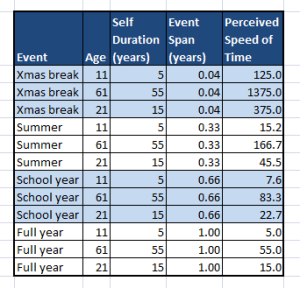Time flies when you’re having fun. Time waits for no man. And sure enough, time appears to move faster as we get older. I’ll preface this by saying that this is (obviously) not an original observation. Furthermore, I don’t think my explanation of WHY time seemed to pass more slowly when we were younger is original either. But it makes the most sense to me when I explain it, so maybe you’ll like it too.
The Short, Obtuse Explanation of Why Time Speeds Up
The relative self-investment of a given time span dictates the speed at which the passing of time is perceived.
U = Self duration (Your age at the time, minus the age at which you started to remember things.)
e = Event Span (e.g. a specific summer)
S = Perceived speed of time
The only slightly longer but clearer explanation of the speed of time
That summer I spent playing basketball with my neighbor Trey, watching Transformers on the boob tube, and um, well, I don’t actually remember too much of what I did when I was eleven years old, but it seemed to last a long time. School was even worse. Those nine months of school seemed like a thousand eternities.
For the sake of argument, let’s assume that kids really start storing long-term memories, i.e. they begin becoming individuals, somewhere around the age of six. It follows then that the three months of a post-fifth-grade summer amount to a whopping five percent (5%) of your life sensations. It seems like a long period of time because, given your only referential (you), it is a long time.
Conversely, 50-year-old you perceives summer’s passage to be much faster because that period is barely half a percent (0.005%) of your accumulated experiences. If my quick math is correct, the difference is about 1,000X. Or put it another way, your sixth-grade summer was something like 100,000% of the proportional time span that the summer of your 50th year will be.
That’s it. But if you’re a big-time geek and/or Billy Mays fan, but wait, there’s more!
Implications of senility, dementia and amnesia on perceived speed of passage of time
Pure speculation here, but I assume memory loss (think: Alzheimer’s) might cause time to slow down. That is to say, if you begin to lose your experiences and frame of reference, thereby attenuating your period of “self duration”, you’ll likely perceive events as taking longer.
In the case of a person with anterograde amnesia, time will largely seem to stand still. (Memento) Whereas a subject with retrograde amnesia would likely immediately perceive time to slow to a crawl and then experience a profound uptick in time’s passage as new memories are forged.
And what are the implications of looking back at past events? Does that 6th-grade summer seem longer the older I get? Does it stay the same? Or is it getting shorter, its time speeding up in tandem with my perception of more recent events? Hmmm… My memory’s not good enough to dwell on that one too much.
Dan Dreifort has been fascinated with time for a long time. He even wrote a song about it. Find it via that link you just read, you know, the one that looks like this, Dan Dreifort. Daniel Dreifort consults on usability, search and efficiency.

Just saw an excellent short film that reminded me of this post.
THE EAGLEMAN STAG
– The larger our past gets the smaller our present feels –
The 2011 BAFTA award winning short film from Mikey Please.